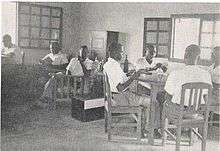Évolué

Évolué (French: [evɔlɥe], lit. "evolved" or "developed") is a French label used during the colonial era to refer to a native African or Asian who had "evolved" by becoming Europeanised through education or assimilation and had accepted European values and patterns of behavior. It is most commonly used to refer to individuals within the Belgian and French colonial empires. Évolués spoke French, followed European (rather than customary) laws, usually held white-collar jobs (although rarely higher than clerks), and lived primarily in urban areas of the colony.
Belgian colonies
The term was also used to describe the growing native middle class in the Belgian Congo (the modern-day Democratic Republic of the Congo) between the latter part of World War II and the independence of the colony in 1960. Most évolués emerged from the Congolese who filled skilled positions (such as clerks and nurses) made available by the economic boom in the country following the war.[1] Colonial administrators defined an évolué as "a man having broken social ties with his group, [and] having entered another system of motivations, another system of values."[2] While there were no universal criteria for determining évolué status, it was generally accepted that one would have "a good knowledge of French, adhere to Christianity, and have some form of post-primary education."[1] Early on in their history, most évolués sought to use their unique status to earn special privileges in the Congo.[3] They asked that the colonial administration recognize their role as mediators between the Belgians and the native "savages."[4]

Since opportunities for upward mobility through the colonial structure were limited, the évolué class institutionally manifested itself through clubs and associations. Through these groups they could enjoy trivial privileges that made them feel distinct from the Congolese "masses".[4] In 1947, there were 110 social clubs consisting of 5,609 members throughout the Congo's cities. From 1952 to 1956, the number of clubs rose from 131 to 317, with their membership increasing from 7,661 to 15,345.[5] Most of these associations were rather small, but some eventually grew in size to encompass entire regions and ethnic groups, such as the Alliance des Bakongo.[6]
By 1958, colonial officials estimated that there were 175,000 people who could be classed as évolués in the colony.[2] In the final years leading up to independence, évolués played a major role in colonial propaganda as they were felt to exemplify the success of the Belgian civilizing mission begun under King Leopold II. In particular, it was felt that after independence, the assimilation of European values by the évolués meant that Belgian civilian inhabitants of the Congo could continue to live in the Congo as part of a culturally European multiracial state.[2]
In 1954, the colonial government opened the University of Lovanium in Léopoldville in order to provide university education to Congolese évolués.
Many of the leaders of the African nationalist parties in the Belgian Congo were members of the évolué class. In the 1970s, the Congolese dictator Mobutu Sese Seko launched a policy known as Authenticité in which he called for Congolese people to renounce all the cultural legacies of the colonial period by dressing and speaking in an "authentic" Congolese manner.
French colonies
In the French colonial empire, évolués were seen as individuals who were the desired end product of France's assimilation policy. Évolués were treated as an élite and a privileged group by the colonial administrators.
See also
References
- 1 2 Gibbs 1991, p. 70
- 1 2 3 Gillet & Cornet 2010, p. 19.
- ↑ Willame 1972, p. 24
- 1 2 Willame 1972, p. 25
- ↑ Willame 1972, p. 26
- ↑ Gibbs 1991, p. 71
Bibliography
- Gibbs, David N. (1991). The Political Economy of Third World Intervention: Mines, Money, and U.S. Policy in the Congo Crisis. American Politics and Political Economy. University of Chicago Press. ISBN 9780226290713.
- Gillet, Florence; Cornet, Anne (2010). Congo-Belgique 1955-1965: Entre Propagande et Réalité. Brussels: Renaissance du livre. ISBN 9782507003302.
- DeLancey, Mark W., and DeLancey, Mark Dike (2000): Historical Dictionary of the Republic of Cameroon (3rd ed.). Lanham, Maryland: The Scarecrow Press.
- Willame, Jean-Claude (1972). Patrimonialism and Political Change in the Congo. Stanford University Press. ISBN 9780804707930.